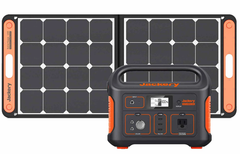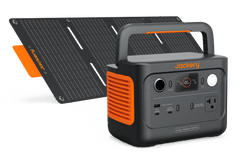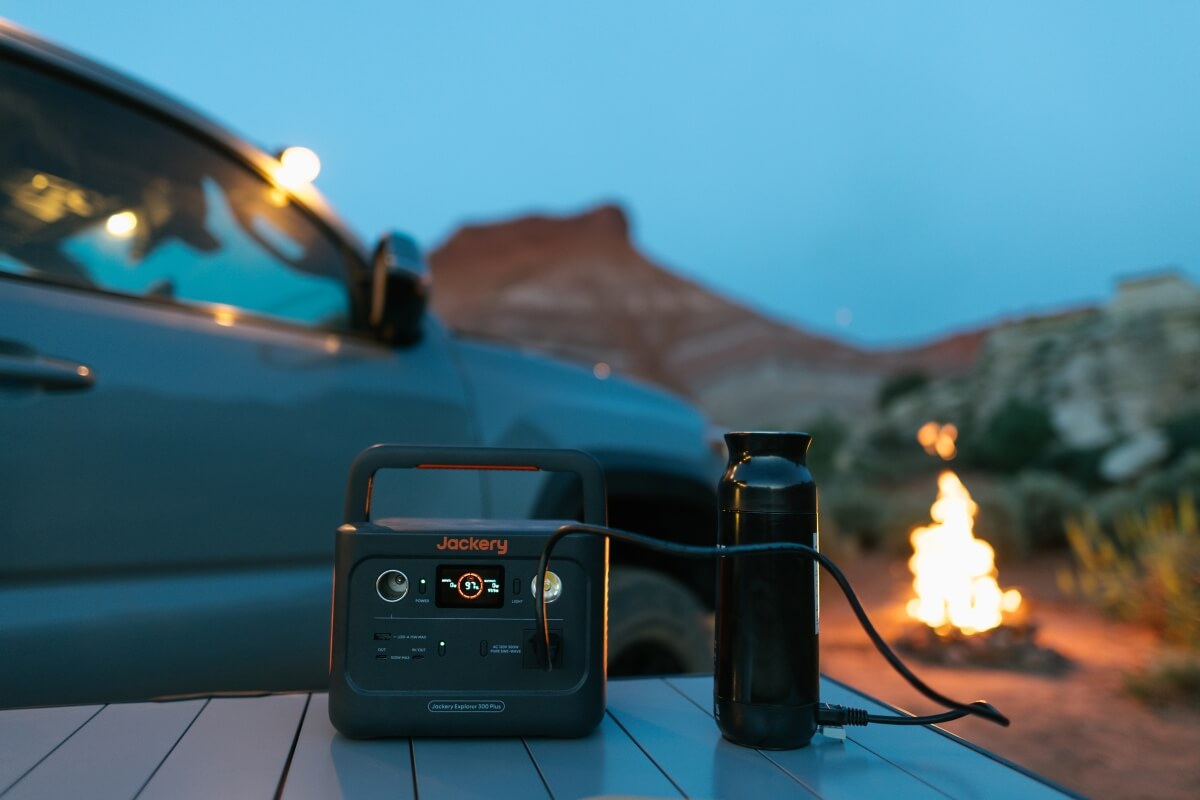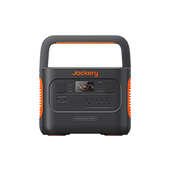3 Best Small RV Generators: Solar Powered, Portable, Reliable
An RV trip may be relaxing, allowing you to see stunning scenery and make memories. The nomadic lifestyle requires a steady power supply despite the thrill of the open road. The small RV generator is a portable powerhouse that keeps you comfortable and mobile. This post explores RV generators and their importance to RV enthusiasts. A reliable power supply is essential to a smooth and pleasurable trip, whether you're a seasoned traveler or just starting out.
Jackery stands out among the rest when it comes to small RV generator brands. With its durable and user-friendly generators, Jackery has established itself as a leader in portable power solutions. This guide will take you through the world of small generators for recreational vehicles (RVs), whether you are looking for mobility, efficiency, or dependability.
|
Products |
Image |
Capacity |
Rated / Peak Power |
Battery |
Size |
|
|
1265Wh |
2000W/4000W |
Li-Fe PO4 |
Length= 14in Width= 10.28in Height= 11.14in |
|
|
 |
518Wh |
500W/1000W |
Li-ion NMC |
Length= 11.2in Width= 7.6in Height= 9.2in |
|
|
 |
288Wh |
300W/600W |
Li-Fe PO4 |
Length= 9.1in Width= 6.1in Height= 6.6in |
Can You Use A Small Generator for RV?
Portable or small generators deliver dependable energy in a tiny package. Their sizes and power outputs range from 1,000 to 4,000 watts or more. These generators may operate on gasoline, propane, or solar energy. RVs work well with small generators. They let RVers power essential appliances and charge electronics while traveling. These generators are designed for RV power and balance mobility and usefulness.
Advantages of a Small RV Generator
An RV with a tiny generator has several benefits:
Portability:
Small generators are lightweight and small, making them easier to travel and store in RVs.
Flexibility:
They power RV fridges, lights, air conditioners, heaters, microwaves, and electronics for comfort and convenience on the road or at a park.
Off-Grid Capability:
They allow RVers to explore varied environments without connecting to the grid.
Emergency Backup:
Small generators keep critical RV systems running during power outages.
Technology:
Quieter operation and fuel economy have reduced noise pollution and fuel consumption, benefiting users and the environment.
Small RV Generator Basics
Small RV generator basics include learning their main characteristics and functions:
Power:
Small generators with 1,000 to 4,000 watts or more may power RV appliances and charge gadgets.
Fuel Type:
They may operate on petrol, propane, or solar electricity, depending on preferences and availability.
Portability:
RVers may carry these generators on their trips due to their compact size and lightweight construction.
Usability:
These generators operate for different amounts of time depending on fuel capacity and demand; however, technology is improving fuel economy and extending tank run durations. Small RV generators are essential, enhancing the nomadic lifestyle and offering flexibility and simplicity of usage for travelers.
What Are The Types of Small RV Generators?
If you are in the market for the best small generator for an RV, you can choose from five types of generators.
Diesel Generators:
RV diesel generators use diesel fuel. Many are more fuel-efficient and last longer than petrol generators. They fit bigger RVs and power-hungry ones.
Propane Generators:
Propane fuels propane generators. They are quieter and emit cleaner than petrol or diesel. These generators are perfect for occasional or emergency usage since propane is conveniently stored.
Gasoline Generators:
Petrol generators are widely accessible. They fit smaller RVs and are inexpensive. Their noise and fuel efficiency are lower than others.
Inverter Generators:
Inverter generators provide computers and phones with clean, consistent power. Their fuel economy and quietness exceed standard generators.
Solar Generators:
Jackery Solar Generators turn sunlight into power using portable solar panels. A tiny power station with a lithium-ion battery and inverter stores this electricity. Solar energy is stored in the battery and converted into AC electricity via the inverter. Multiple output ports AC, DC, and USB can charge gadgets and appliances with this stored power.

|
Types of RV Generators |
Pros |
Cons |
Working Principles |
|
Diesel Generator |
Uses less fuel, lasts longer, and is better for high power needs. |
More pollution and a higher start-up cost than some other options. |
Diesel generators make power with a diesel engine. Diesel fuel is put into the engine, squished down, and lit on fire to make electricity. |
|
Propane Generator |
cleaner emissions, quieter operation, easily stored fuel. |
, slightly lower power output, and propane availability can be an issue. |
Propane generators use fire to make electricity. They burn propane gas to power an engine, which then makes electricity. |
|
Gasoline Generator |
Widely available fuel, affordable initial cost. |
The noisier operation is less fuel-efficient compared to some other options. |
Like a car engine, petrol generators have an engine that burns petrol to make mechanical energy that is then turned into electrical energy. |
|
Inverter Generator |
Quiet operation, fuel-efficient, produces stable power for sensitive. |
Higher initial cost low power output compared to conventional generators of the same size. |
Inverter generators make power that is first AC, then DC, and finally back to a stable AC current. They control the power flow based on demand, which saves fuel and makes the energy cleaner so sensitive devices can use it. |
|
Solar Generator |
Environmentally friendly, silent operation, uses renewable energy. |
Depending on sunlight availability, it may have limited power output. |
Panels on solar generators harness sunlight. Solar panels generate power, which is stored in batteries. An inverter may transform this stored energy to AC power or power devices. |
What Size of Small Generator is Needed for an RV?
Understanding the power usage of your appliances and gadgets helps you choose a small RV generator size. Calculate power usage and generate a table to determine generator size:
Calculating power consumption:
List all RV equipment and gadgets:
Note their W or A ratings. Device labels and user manuals usually provide this information. For devices with amp power ratings, use the formula Watts = Volts × Amps to estimate energy use. No conversion is needed for watt-rated devices.
Consider Running and Starting Watts:
Some appliances have larger (surge) starting watts than running. Make sure your generator can manage your appliances' peak starting and operating watts.
|
Camping / RV Appliance a |
Rated (Running) Watts S |
Additional Surge Watts : |
|
4 Light Bulbs (75W) |
300 W |
300W |
|
Dehumidifier |
785 W |
1250 W |
|
Electric Blanket |
80 W |
1,250 W |
|
Electric Water Heater (6Gal.) |
1,440 W |
1,440 W |
|
Fan |
200 W |
200 W |
|
Furnace Fan (1/3 HP) |
700 W |
1,400 W |
|
Heating Pad |
250W |
250 W |
|
RV Roof-Top AC (11,000 BTU) |
1,010 W |
590 W |
|
RV Roof-Top AC (13,500 BTU) |
1,500 W |
1,000 W |
|
RV Roof-Top AC (15,000 BTU) |
2,000 W |
1,300 W |
|
Space Heater |
1,800 W |
1,800 W |
Calculating Jackery Power Station Work Hours:
You can easily calculate the working hours of a Jackery power station:
Battery size in watt-hours:
The first thing you need to consider is your generator's battery size in Watt-hours. It tells you how much power your generator produces.
Loss of Efficiency:
Loss of energy is inevitable as power passes through inverter and other parts. The average model offers 85 to 90% efficiency.
This formula can calculate how many hours your power station will work if you know the battery size, the wattage of the device you want to run, and the efficiency loss percentage:
Working Hours = (Battery Capacity in WH) × 0.85 / (Device Power Consumption in W)
If you want to power a 75W bulb with a Jackery solar generator 300 plus, here is how many hours you can use it.
Working Hours = (288WH) × 0.85 / (75W)
Working Hours = 3.3 Hours
Jackery Small Generators for RV
The Jackery Solar Generators is a handy and eco-friendly solution to harvest solar energy for outdoor enthusiasts, RVers, and anybody wanting off-grid electricity. Its high-efficiency solar panels and power station with lithium-ion/Li-Fe PO4 batteries and inverters enable customers to charge gadgets, operate appliances, and power electronics while traveling. RV owners may use the Jackery Solar Generator to generate clean, sustainable energy without gasoline while travelling.
Jackery Solar Generator 1000 Plus for RV
The Jackery Solar Generator 1000 Plus has a robust lithium-ion battery, 1265Wh capacity, and 2000W rated output (4000W peak). Small and portable, it supports solar panels, AC outlets, and 12V automobile adapters for charging. It's popular for off-grid power because of its MPPT controller, many output ports, and favorable customer reviews praising its dependability and adaptability.

|
Product |
Solar Generator 1000 Plus |
|
Capacity |
1265Wh |
|
Battery Cell |
Li-Fe PO4 |
|
Dimension |
Height 11.4 in, Length 14 in, Width 10 in |
|
Life Cycle |
4000 charge and discharge cycles |
|
Recharging Methods |
You can recharge it via an AC wall outlet, a 12V car outlet, or solar panels. |
|
Output Ports |
AC Output(x3), USB-A Output(x2), USB-C Output(x2) |
Jackery Solar Generator 500 for RV

Jackery Solar Generator 500's 518Wh capacity, 500W rated power (1000W surge), and lithium-ion battery provide continuous energy for numerous applications. A simple interface and solar panel extension flexibility make the Solar Generator 500 user-friendly. Its portability, dependability, and ability to charge many devices make it a popular outdoor and emergency power option.
|
Product |
Solar Generator 500 |
|
Capacity |
518Wh |
|
Battery Cell |
Li-ion |
|
Dimension |
Length 11.8 in, Width 7.6 in, Height 9.2 in. |
|
Life Cycle |
500 cycles to 80%+ capacity |
|
Recharging Methods |
Solar panels, AC outlet, car charger |
|
Output Ports |
AC Output(x1), USB-A Output(x2), USB-C Output(x3) |
Jackery Solar Generator 300 Plus for RV

Jackery Solar Generator 300 Plus, a portable power station with 288Wh capacity, 300W rated power (600W surge), and a durable Li-Fe battery, powers various gadgets. Its tiny, portable design makes it perfect for outdoor usage. For dependable and portable off-grid electricity, the Solar Generator 300 Plus is popular due to its camping-friendly design, emergency backup capabilities, and efficient charging.
|
Product |
Solar Generator 300 Plus |
|
Capacity |
288Wh |
|
Battery Cell |
Li-Fe PO4 |
|
Dimension |
Length 9.1 in, Width 6.6 in, Height 6.1 in. |
|
Life Cycle |
4000 cycles |
|
Recharging Methods |
Solar panels, AC outlet, car charger |
|
Output Ports |
AC Output(x1), USB-A Output(x1), USB-C Output(x1), USB-C Output(x2) |
How to Choose the Best Small RV Generator?
To satisfy demands and preferences, you can choose the best small RV generator by examining many critical factors:
Power Requirement:
Assess RV equipment and gadgets' power demands. Determine the continuous (running) and peak (starting/surge) wattages to verify the generator can manage the load without overloading.
Fuel and Efficiency:
Choose from gasoline, diesel, propane, inverter, or solar generators. To suit your RV lifestyle and environmental choices, consider fuel availability, noise, fuel economy, and eco-friendliness. Assess the generator's fuel efficiency and tank capacity. An efficient generator can operate longer without refueling, delivering more electricity.
Size and Portability:
Consider generator size and weight. Make sure it matches your RV storage area and is easy to transfer, particularly if you move it often.
Noise and Maintenance:
Some are quieter. For campers or regions with noise restrictions, use a quieter generator. Choose a generator with simple controls, start mechanisms, and maintenance. Consider remote or electric start for convenience.
Small RV Generator FAQs
- What size generator do I need for a 30A RV?
For a 30A RV, you'd generally require a generator with a capacity of around 3000-4000 watts to power most of your appliances and devices.
- How long does a small RV generator last?
The lifespan of a small RV generator varies but typically ranges from 1,500 to 2,000 hours of use. Jackery Solar Generators are known for their durable build, providing a lifespan of several years and thousands of recharge cycles with proper care and maintenance.
- What is the quietest generator for an RV? How do I quiet down my RV generator?
Some of the quietest generators for RVs are solar generators, such as those offered by Jackery, known for their quiet operation. To further reduce noise, consider placing the generator on a sound-dampening mat, installing a generator muffler, or positioning it farther away from your RV and using longer extension cords to mitigate noise inside your vehicle.
Final Thoughts
Let’s conclude our guide on the best small RV generator. If you are an RV enthusiast and go on long camping trips with your family and friends, you should know the importance of having power on the go. With a small portable generator, you can access electricity without a grid and power your appliance or have internet in a forest or a mountain. Jackery Solar Generators are the best portable power sources as they are compact, reliable, and easy to use. The best part about having a Jackery product is that your generator is not harming the environment due to green electricity.
Disclaimer:
The runtime mentioned for appliances powered by Jackery is for reference only. Actual runtime may vary under different conditions. Please refer to real-world performance for accurate results.












































































































Leave a comment